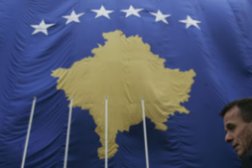Kosovo may have declared independence in 2008, but for the past two and half years it has been unable to enjoy many of the trappings of full statehood.
Thursday's ruling from the International Court of Justice allowed ethnic Albanian Kosovars to breathe a sigh of relief.
They knew that if their independence declaration been deemed illegal, further integration into the international community would have ground to a halt.
Even with the ruling, there is a long way to go.
Membership of the United Nations, the World Trade Organization and the European Union are all dependent on more countries recognizing Kosovo as a legitimate state, something which so far, just 69 of 192 UN member states have done.
Until it acheives further recognition, Kosovo must wait in an international limbo in which activities taken for granted by most other countries are kept beyond the country's reach.
The national football team is yet to play its first competitive match, and athletes are training for the 2012 Olympic games more in hope than expectation.
Aspirations
Kosovo's distinctive flag, the winner of an open competition run by the government in the run-up to the independence declaration, reflects the aspirations currently sustaining the majority ethnic Albanian population.
With a golden map crowned with stars on a royal blue background, the flag is strikingly similar to that of the European Union, an international organisation that Kosovo hopes one day to join.
That day is still a long way off. Before serious membership negotiations - themselves a tortuously lengthy process - can begin, the EU will have to agree that Kosovo is, in fact, a country.
At present 22 of the 27 EU member states have recognized Kosovo's independence, with Cyprus, Slovakia, Romania, Greece and Spain refusing to do so.
Kosovo insists that in light of the new ICJ ruling such states should reverse their positions and recognise their state.
"There is no dilemma anymore, even for the people of Serbia and the government of Serbia," Hajredin Kuqi, Kosovo's deputy prime minister, says.
Not everyone agrees.
On Friday, the Slovakian defense minister said his country's position on Kosovo's independence was not subject to change and Spain said only that it would "respect" the ruling, not that it would recognize Kosovo.
Catherine Ashton, the EU foreign policy chief, says the future of both Kosovo and Serbia lies within the EU, and offered to oversee dialogue between Belgrade and Pristina aimed at resolving the issue.
Implacably opposed
But the two sides are as implacably opposed as they were on the day that they walked out of the negotiating room for the last time before Kosovo's declaration came.
"We need to support each other for EU integration," Kuqi admit, saying the government of Serbia has peddled "myths" to its people about Kosovo and should now "move forward."
Membership of the UN anytime soon looks almost as remote as EU accession; there are 123 UN members that do not recognize Kosovo.
Amongst them are two powerful permanant members of the UN Security Council, Russia and China, as well as a host of emerging regional powerhouses, including Brazil, India and Venezuela.
Persuading them to accept Kosovo's indepence will be no easy feat.
Russia has already said it will ignore the ICJ ruling and maintain its refusal to treat Kosovo as a state and if the 21st century belongs, as many predict, to the BRIC nations, Kosovo's future does not look as secure as many in Pristina would like.
With the court's decision in its favour, Kosovo says it will push on regardless of its opponants, approaching coutries on an individual basis in a bid to establish bilateral ties and seeking eventual membership of international organisations.
"We will start to apply for membership to the UN, and we'll start to apply for other international organisations," Kuqi insists.
In the mean time, Kosovo can only wait and see what impact the ICJ ruling has on its quest for international recognition.
Pristina's declaration of independence has been declared legal; the question now is whether Kosovo can persuade its doubters to legitimise it.
PHOTO CAPTION
Kosovo's national flag represents the European hopes of the government in Pristina.
Al-Jazeera


 Home
Home Discover Islam
Discover Islam Quran Recitations
Quran Recitations Lectures
Lectures
 Fatwa
Fatwa Articles
Articles Fiqh
Fiqh E-Books
E-Books Boys & Girls
Boys & Girls  Ramadan
Ramadan Fatwa Audios
Fatwa Audios Month of Mercy
Month of Mercy Women
Women Eed Al- Fitr
Eed Al- Fitr Food Recipes
Food Recipes Videos
Videos

 Prayer Times
Prayer Times












